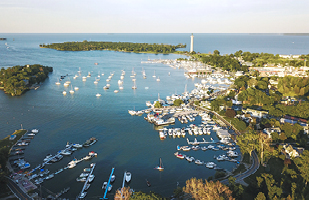Put-In-Bay Attraction Denied Refund of Resort-Area Tax

The Court rejected a Put-in-Bay tourist attraction’s attempt to obtain a $264,000 “resort-area tax” refund.

The Court rejected a Put-in-Bay tourist attraction’s attempt to obtain a $264,000 “resort-area tax” refund.
A Put-in-Bay tourist attraction’s attempt to obtain a $264,000 “resort-area tax” refund from the village was rejected by the Supreme Court of Ohio today.
The Supreme Court unanimously affirmed the Ohio Board of Tax Appeals (BTA) denial of a refund claimed by Colonial Inc. The BTA notes Colonial does business as Island Beverage & Beer Barrel Saloon. Colonial argued that, because the village’s authority to impose the tax depends on census data, Put-in-Bay is required to reenact its resort-area gross-receipts excise tax after each decennial census. After the 2010 census, the village, which originally adopted the tax in 1995, took no action on the tax until 2016.
In a per curiam opinion, the Court ruled that Colonial’s interpretation might be good public policy but is not required.
“Although it might have been reasonable for the General Assembly to take such an approach, the statute as enacted does not impose that requirement, and the statute’s text controls,” the opinion stated.
The Beer Barrel owners were not the only business to challenge the resort-area tax they paid between 2011 and 2016. The BTA noted that at least nine other Put-In-Bay taxpayers sought refunds. The BTA stayed decisions on those cases until the Supreme Court decided Colonial’s case.
Lawmakers Revamp Tax After Legal Challenge
State lawmakers created the resort-area tax in 1993, following a challenge to an earlier “island tax” that Colonial successfully challenged before the Court. In its 1992 Put-In-Bay Island Taxing Dist. Auth. v. Colonial, Inc. decision, the Court ruled the island tax was unconstitutional because it applied only in the fixed geographic areas—the islands—rather than operating uniformly throughout the state.
By contrast, the resort-area tax applies if a city, village or township meets three criteria. Most importantly in this case, R.C. 5739.101 permits a municipality or township to declare itself a resort area and impose the resort-area tax if “during the most recent decennial census,” at least 62% of total housing units in the resort area must be classified as “for seasonal, recreational, or occasional use.”
Based on the 1990 census, Put-in-Bay met the qualifications of the law. It was permitted to impose an excise tax on the gross receipts of a business making sales or transporting people or property to and from the village. In 1995, the village enacted a .5% resort-area tax. Through further legislation, it increased the tax in 1999 to 1% and then to 1.5% in 2001.
The village took no other action on the tax until July 2016 when it renewed the 1.5% tax rate. In 2018, Colonial sought a refund from the Ohio tax commissioner, arguing it did not owe the resort-area tax from January 2011 through June 2016 because the village did not reenact the resort-area tax following the 2010 census. The tax commissioner denied the refund, finding that R.C. 5739.101(D) specifies when the tax takes effect, but does not discuss an end date or any requirement to reenact the tax every 10 years.
Colonial appealed to the BTA, which focused on the law’s “most recent decennial census” phrase. The BTA concluded the 1990 census was the most recent census Put-in-Bay used to enact the tax in 1995. The BTA ruled that the tax did not need to be renewed once the village met the law’s qualifications to impose the tax.
Colonial appealed to the Supreme Court, which was required to hear the case.
Supreme Court Analyzed Tax Law
Colonial argued that because the village’s qualification to impose the tax depends on the results of each census, Put-in-Bay was required to determine after the 2010 census that it still met the law’s definition of a resort area. Since the village did not pass an ordinance renewing the tax until July 2016, no resort-area tax was owed from the beginning of 2011 until the ordinance passed, the business asserted.
The Court’s opinion noted R.C. 5739.101 states the village can declare itself a resort area if it meets the criteria and, once it has done so, can pass legislation to impose the tax. “Notably absent” from state law is any indication that a previously enacted resort-area tax automatically “sunsets,” the opinion stated.
Nothing in state law indicated the village must declare its resort-area status after each census or renew the tax at 10-year intervals, the Court concluded.
2021-0373. Colonial, Inc. v. McClain, Slip Opinion No. 2022-Ohio-1149.
 Listen to oral argument audio of this case.
Listen to oral argument audio of this case.
Please note: Opinion summaries are prepared by the Office of Public Information for the general public and news media. Opinion summaries are not prepared for every opinion, but only for noteworthy cases. Opinion summaries are not to be considered as official headnotes or syllabi of court opinions. The full text of this and other court opinions are available online.
Acrobat Reader is a trademark of Adobe Systems Incorporated.


